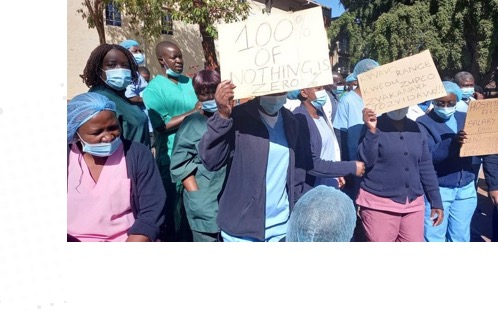|
Getting your Trinity Audio player ready...
|
By Own Correspondent
The economic crisis that Zimbabwe is facing has worsened the majority of the country’s development indicators with none faring worse than Health Care provision. The healthcare system is characterised by grave inequalities that have also been intensified by the pandemic which caused a significant loss on the gains of the past few decades. Key to note, there are country-specific challenges with corruption, poor remuneration of healthcare workers, and unavailability of machines/ medicines amongst other questions for the government. These gaps demand specific actions by the government at sectoral specific policy level and generalized economic management such as fiscal expenditure discipline and direction of funds to social protection in the sector.
Below, we discuss the health care crisis specific to various sections in Zimbabwe:
Access for People Living With Disability (PWD)
Zimbabwe has been facing a protracted economic crisis over the last few years and the denialism of the government and continued statement that all is well has led to worsening service delivery. This coupled with inconsistent economic policies is exposing the cavity in the health sector which particularly affects marginalized groups, especially in rural areas.
Persons with disabilities (PWD) have been severely affected as they have been struggling to get medical treatment and to access user-friendly public transport from rural areas. This is also a reflection of the wider scope of marginalization that they have been exposed to in light of efforts engaging the government to consider them when procuring buses but with no meaningful response. These two are connected as many PWDs have defaulted on their medical treatments due to delays or the absence of viable transport options.
Access for Pregnant Women
The healthcare situation has also left behind pregnant women. Zimbabwe has a high maternal mortality rate of 458 children dying per 100 000 live births. This is a discouraging number in 2022, especially for a country that has committed to providing to provide free maternal health services. Robust social protection mechanisms should be put in place to cater to the needs of vulnerable groups including pregnant women so that there is quick redress of this indicator. In rural areas, challenges are also centered around the provision of resources such as water and electricity at clinics and hospitals that offer delivery services.
Access to forex
“Some of us don’t have the money that the clinic might require, so they ask us to bring grain in order to get medical assistance. Government has a responsibility to ensure that there is equality of access to healthcare services and the unfolding currency crisis has discouraged this. While the government insists that the local currency remains the primary means of transacting, service providers are now demanding United States Dollars (USD). In Muzarabani, citizens are resorting to barter trade to access healthcare services as the community is transacting in USD and Mozambican Metical. One villager exclaimed,
The mantra “Leaving no one behind” is then put to question when some communities remain marginalized in this manner.
Health Sector Corruption
Health sector corruption is also a pressing issue requiring immediate attention as seen during the pandemic after the breaking of the $60 million Drax Scandal which involved the highest office in the health sector, the Minister of Health and Child Care. If corruption continues at that level, it is important that we speak of the human cost of this corruption which includes the over 5 000 people that lost their lives to this pandemic.
Health Care Worker’s Remuneration
In July 2020, social and conventional media was outraged after seven babies were stillborn in Harare while nurses were on strike due to shortages in Protective Personal Equipment (PPE). This is a further manifestation of the challenges around remuneration for civil servants who are still receiving salaries in the fragile local currency.
The unwillingness of the government to sincerely come to the table then has continued and this will lead to further loss of life which can be avoided.
Recommendations
Following these challenges, we proffer the below recommendations to improve the nation’s health indicators:
- On prioritization of projects, healthcare should be prioritized in the country as well as resuscitation and maintenance of existing clinics and hospitals.
- Devolution funds should be timeously disbursed to cater for public service delivery needs in communities. Instead of imposing projects on the communities, they have the right to decide on what to prioritize as enshrined in the Constitution of Zimbabwe Chapter 14, Section 264.
- Funds such as Special Drawing Rights (SDR) from the International Monetary Fund (IMF) should be used for improvement of the health sector.
- Government should seek to strengthen procurement procedures in the healthcare sector and deliberately fight corruption that has plagued the sector.






